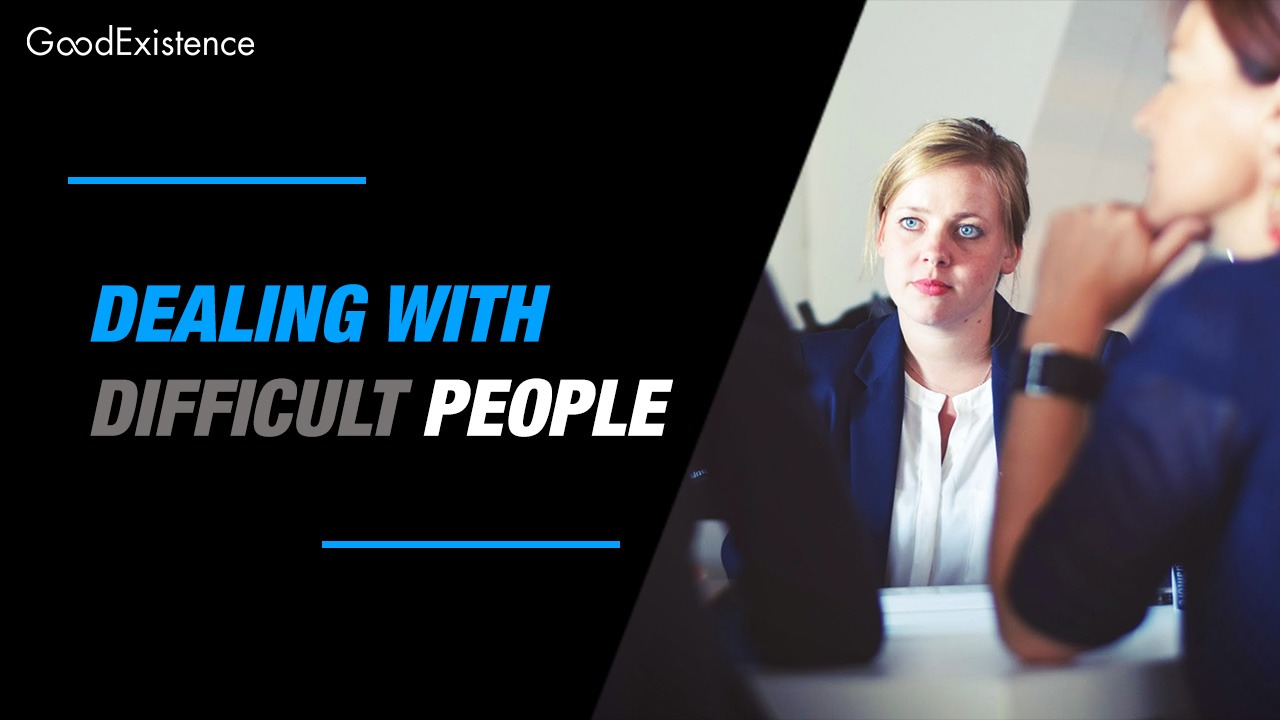
Want to learn how to deal with difficult people in your life either at work or in your circle of friends and family? Then keep on reading this article to see some of the solutions that might help you with this.
Dealing with difficult people is something that most of us will encounter at some point in our lives, whether it’s in our personal or professional relationships.
Difficult people can come in different forms, from those who are always negative and critical to those who are confrontational and aggressive.
Whatever the type, dealing with difficult people can be a challenge, but it’s not impossible.
Learning how to deal with difficult people is an essential skill that can benefit us in many ways. It can help us to diffuse tense situations, maintain healthy relationships, and reduce our stress levels.
In this article, we’ll explore ten tips and strategies for dealing with difficult people.
1. Understand the root cause of their behavior

The first step in learning how to deal with difficult people is to try and understand them.
In order to understand the root cause of difficult behavior, it’s important to observe and listen carefully. For example, if a coworker is constantly criticizing others and being defensive, it could be a sign of deep-seated insecurity.
By listening to their words and observing their behavior, we can start to piece together what might be causing their difficult behavior.
Sometimes, understanding the root cause may require us to have difficult conversations with the person. In these conversations, it’s important to approach the situation with empathy and a willingness to listen.
When we care about their well-being and are willing to work towards a resolution, we can often gain valuable insights into their behavior.
Additionally, it can be helpful to seek the advice of a mental health professional or other expert.
They can provide additional insights and strategies for dealing with difficult people, and help us to approach the situation in a more productive and compassionate manner.
One quote that encapsulates the importance of understanding the root cause of difficult behavior comes from Stephen Covey, who said:
Seek first to understand, then to be understood.
If we take the time to understand the root cause of someone’s difficult behavior, we can develop a deeper level of empathy and compassion toward them, and find more effective ways to address the situation.
2. Remain calm and composed
Remaining calm and composed can be challenging, especially when dealing with someone who is confrontational or aggressive. However, keeping your emotions in check is crucial in diffusing a difficult situation.
One way to remain calm in situations like these is to take deep breaths and count to ten before responding. This can help you to think more clearly and respond in a rational manner.
You should also try and avoid using accusatory or judgmental language, which can further escalate the situation. Instead, use “I” statements to express how their behavior is impacting you.
It’s also important to remember that remaining calm and composed doesn’t mean that you have to tolerate unacceptable behavior. You can still assert your boundaries and stand up for yourself while maintaining a calm demeanor.
Leadership is not about being in charge. It’s about taking care of those in your charge.
Simon Sinek
This applies to difficult people as well. If you try to remain calm and composed, you are taking care of the situation and the people involved.
3. Set clear boundaries
One of the most effective ways to deal with difficult people is to set clear boundaries.
Boundaries can help to define what is acceptable behavior and what is not, and they can help us to protect our own well-being.
Setting boundaries can be as simple as saying “I’m not comfortable with this conversation” or “I need some space right now.”
However, setting boundaries can be challenging, especially when dealing with difficult people who may push back or disregard them.
It’s important to be firm and consistent with our boundaries, and not give in to pressure or manipulation.
It’s also crucial to communicate our boundaries clearly and respectfully, without being confrontational or aggressive.
Another aspect of setting clear boundaries is knowing our own limits and needs. We need to be aware of what we can and cannot tolerate, and be willing to assert ourselves when necessary.
This can involve saying “no” to unreasonable demands, or expressing our needs and preferences in a respectful way. When we set clear boundaries, we create a safer and more respectful environment for ourselves and others
4. Use active listening

Active listening is a powerful communication tool that can help us to better understand the other person’s perspective.
It involves fully focusing on the other person, giving them our undivided attention, and asking open-ended questions to encourage them to share their thoughts and feelings.
Through active listening, we can show the other person that we value their opinions and are willing to listen to them, even if we disagree.
This can help to build trust and create a more positive, respectful dialogue, which in turn can lead to finding solutions to difficult situations.
Active listening can also help us to avoid misunderstandings and miscommunications and can lead to a deeper understanding and appreciation of the other person’s point of view
5. Choose your battles
Not every situation with a difficult person needs to be addressed. It’s important to choose our battles wisely and to prioritize our energy and resources.
If the situation is not important or is unlikely to change, it may be best to let it go.
It’s also important to consider the potential consequences of engaging in a conflict with a difficult person. Will it harm our relationship with them or with others? Is it worth the emotional stress and energy required to engage in the conflict?
Sometimes, choosing not to engage in a battle can be the most effective strategy for dealing with difficult people.
It can demonstrate emotional maturity and restraint, and may even diffuse the situation in the long run.
However, if the issue is important and requires action, it’s important to address it in a calm and respectful manner and to stand up for our own needs and boundaries.
6. Practice empathy
Empathy is the ability to understand and share the feelings of another person.
When dealing with difficult people, it’s important to practice empathy and put ourselves in their shoes.
Through empathy, we can better understand their perspective and find ways to address their concerns.
7. Stay solution-focused
When dealing with difficult people, it’s easy to get caught up in the problem and the negative emotions surrounding it. However, it’s important to stay solution-focused and to focus on finding a resolution to the situation.
Staying solution-focused means shifting our attention from the problem itself to finding ways to resolve it.
This can involve brainstorming different solutions, asking for help or advice, or being open to compromise. By actively seeking out solutions, we can avoid getting stuck in a negative cycle of blame and frustration.
One technique for staying solution-focused is to use positive language and frame the situation in a way that emphasizes progress and growth.
Instead of saying “I can’t deal with this difficult person,” we can reframe it as “I’m learning how to deal with challenging situations.” This shift in mindset can help us to stay motivated and focused on finding a solution.
Staying solution-focused also means being willing to forgive and move on from past conflicts. This can be challenging, especially if the difficult person has caused significant harm.
However, holding onto grudges and resentment only prolongs the negative emotions and prevents us from moving forward.
8. Find common ground

Connecting with a difficult person on a common ground can be challenging, but it is a powerful way to bridge differences and find solutions.
Discovering areas of mutual interest or shared values can help establish a connection and build a foundation for working towards a common goal.
This may involve active listening to the other person’s ideas and perspectives, and finding ways to integrate them with our own.
It could also involve finding a common purpose, such as a shared vision for a project or a desire to improve a specific situation.
Ultimately, finding common ground can lead to a more productive and collaborative relationship with the difficult person.
9. Practice self-care
Dealing with difficult people can be emotionally draining and stressful. It’s important to practice self-care and to take care of our own well-being.
This may involve taking breaks when needed, engaging in activities that bring us joy, and seeking support from others.
10. Seek professional help

Finally, if dealing with difficult people is causing significant distress or is impacting our mental health, it may be necessary to seek professional help.
A therapist or counselor can provide valuable support and guidance in navigating challenging relationships.
Dealing With Difficult People: Conclusion
In conclusion, dealing with difficult people can be a challenging task, but it is a skill that can be learned and developed over time.
By implementing these 10 tips and strategies, you can better navigate difficult situations and people with confidence and grace.
Remember that it is important to remain calm and composed, and to approach the situation with an open mind and willingness to listen.
With patience, understanding, and effective communication, you can find common ground and resolve conflicts in a positive way.
Above all, it is essential to take care of yourself and prioritize your well-being. If a situation becomes too overwhelming or toxic, it is okay to step back and seek support from friends, family, or a professional.
Practicing even a few of these tips and strategies will help you become a more effective and resilient communicator, capable of handling even the most challenging situations with ease and grace.
So, the next time you find yourself facing a difficult person, take a deep breath, remember these tools, and approach the situation with confidence and a willingness to learn and grow.
Have you enjoyed the tips on How to Deal With Difficult People? If so, then please bookmark this page and share it with your friends!


